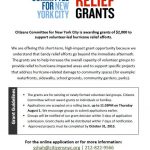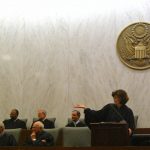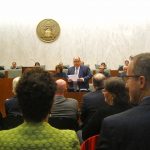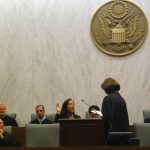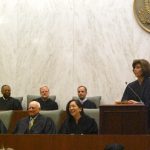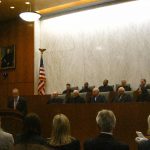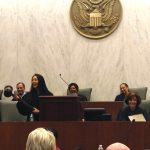NAPABA Applauds Marriage Equality Decisions
FOR IMMEDIATE RELEASE
June 26, 2013
Contact: Emily Chatterjee
(202) 775-9555
WASHINGTON – In two watershed marriage equality decisions announced today, the U.S. Supreme Court held in United States v. Windsor that Section 3 of the Defense of Marriage Act (DOMA) is unconstitutional, and found that proponents of Proposition 8 in Perry v. Hollingsworth lack standing to appeal the federal district court decision, which struck down the amendment. The National Asian Pacific American Bar Association (NAPABA) has long supported marriage equality, and joined amicus briefs in the U.S. Supreme Court as well as in lower court proceedings in both cases.
“Today is a historic day for our nation as we move one step closer to equality for all Americans,” said Wendy C. Shiba, president of NAPABA. “As a Californian, I am especially proud that NAPABA has supported marriage equality in Windsor and Perry, and in many other cases, and we look forward to the implementation of both decisions.”
Windsor challenged DOMA, a federal law that denies legally married same-sex couples the same federal benefits provided to heterosexual spouses. Justice Kennedy delivered the 5-4 decision and held that “though Congress has great authority to design laws to fit its own conception of sound national policy, it cannot deny the liberty protected by the Due Process Clause of the Fifth Amendment.”
In Perry, Chief Justice Roberts led the 5-4 Court in dismissing an appeal to reinstate California’s Proposition 8, a voter-passed measure outlawing marriage between same-sex couples because of lack of standing. Chief Justice John Roberts wrote in the majority opinion “[w]e have never before upheld the standing of a private party to defend the constitutionality of a state statute when state officials have chosen not to. We decline to do so for the first time here.”
###
The National Asian Pacific American Bar Association (NAPABA) is the national association of Asian Pacific American attorneys, judges, law professors, and law students. NAPABA represents the interests of over 40,000 attorneys and 66 state and local Asian Pacific American bar associations. Its members include solo practitioners, large firm lawyers, corporate counsel, legal service and non-profit attorneys, and lawyers serving at all levels of government. NAPABA continues to be a leader in addressing civil rights issues confronting Asian Pacific American communities. Through its national network of committees and affiliates, NAPABA provides a strong voice for increased diversity of the federal and state judiciaries, advocates for equal opportunity in the workplace, works to eliminate hate crimes and anti-immigrant sentiment, and promotes the professional development of people of color in the legal profession.
2013 NAPABA Convention Scholarship Application Deadline: August 30, 2013
NAPABA strives to keep the Convention affordable for our members and offers one of the best values among legal education conferences. NAPABA also maintains a scholarship fund to help further defray costs for attendees through full or partial registration waivers, travel stipends, and lodging stipends.
Scholarship applications for the 2013 Convention are due August 30. Apply today if you need assistance with travel and registration costs. We look forward to seeing you in Kansas City, Missouri on November 7-10.
Please fill out the online form by clicking here.
NAPABA Condemns Voting Rights Act Decision
FOR IMMEDIATE RELEASE
June 25, 2013
Contact: Emily Chatterjee
(202) 775-9555
Urges Bipartisan Congressional Action to Protect Voters
WASHINGTON, DC – The National Asian Pacific American Bar Association (NAPABA) is dismayed by the U.S. Supreme Court’s decision today to strike down Section IV of the Voting Rights Act in Shelby County, Alabama v. Holder. Section IV includes the coverage formula for the Voting Rights Act of 1965, which was reauthorized by Congress as recently as 2006. NAPABA joined an amicus brief in Shelby County earlier this year that argued in support of upholding the constitutionality of the Voting Rights Act.
“The Voting Rights Act has been a crucial tool in combatting voter discrimination, which unfortunately continues today,” said Wendy C. Shiba, president of NAPABA. “We are deeply disappointed by the Court’s decision in Shelby County, which does not reflect current realities facing voters, including vulnerable Asian Pacific American voters. We strongly urge Congress to act swiftly in a bipartisan manner to develop a new coverage formula. All Americans who are eligible to vote must be able to do so.”
In 2006, the Senate voted 98-0 to reauthorize the Voting Rights Act, while the House of Representatives voted 390-33. The Voting Rights Act was first passed by Congress in 1965. Prior to today’s decision, the Court had previously upheld the Voting Rights Act four times.
###
The National Asian Pacific American Bar Association (NAPABA) is the national association of Asian Pacific American attorneys, judges, law professors, and law students. NAPABA represents the interests of over 40,000 attorneys and 66 state and local Asian Pacific American bar associations. Its members include solo practitioners, large firm lawyers, corporate counsel, legal service and non-profit attorneys, and lawyers serving at all levels of government. NAPABA continues to be a leader in addressing civil rights issues confronting Asian Pacific American communities. Through its national network of committees and affiliates, NAPABA provides a strong voice for increased diversity of the federal and state judiciaries, advocates for equal opportunity in the workplace, works to eliminate hate crimes and anti-immigrant sentiment, and promotes the professional development of people of color in the legal profession.
AALDEF Press Release on SCOTUS Decision in Shelby
AALDEF Press Release on SCOTUS Decision in Shelby
The Asian American Legal Defense and Education Fund (AALDEF) and Asian Americans Advancing Justice-AAJC (Advancing Justice-AAJC) (formerly known as Asian American Justice Center) criticize the decision by the U.S. Supreme Court to strike down Section 4, the coverage mechanism of Section 5 of the Voting Rights Act of 1965 (VRA), in Shelby County, Alabama v. Holder. Earlier this year, AALDEF and Advancing Justice-AAJC filed an amicus brief with the U.S. Supreme Court on behalf of 28 Asian American groups to uphold Section 5, which was reauthorized by Congress in 2006 and is intended to stop voter discrimination before it occurs.
Please click on the link in the title to read the full press release.
CBAC Reassured by Supreme Court’s Decision in Fisher v. University of Texas at Austin




FOR IMMEDIATE RELEASE
June 24, 2013
HNBA Contact: Erika Lopez (202) 223-4777
NAPABA Contact: Emily Chatterjee (202) 775-9555
NBA Contact: Erika Owens (202) 842-3900
NNABA Contact: Mary Smith (405) 761-1723
Coalition of Bar Associations of Color
Reassured by Supreme Court’s Decision in Fisher v. University of Texas at Austin
WASHINGTON – The Coalition of Bar Associations of Color (CBAC) – the Hispanic National Bar Association (HNBA), the National Asian Pacific American Bar Association (NAPABA), the National Bar Association (NBA) and the National Native American Bar Association (NNABA) – is reassured by the Supreme Court’s decision today to reaffirm the principle that diversity in higher education is a compelling national interest. We remain cautiously optimistic about the Court’s decision to send the case back to the Fifth Circuit Court of Appeals.
The Supreme Court partially vacated a lower court ruling that had upheld the right of the University of Texas at Austin to partially consider race in its admissions’ policy. However, in deciding Fisher v. University of Texas at Austin, it left intact the precedent it set in Grutter v. Bollinger, which allows schools to consider racial diversity as an admissions factor.
Last summer, CBAC filed an amicus curiae brief with the Supreme Court in the Fisher v. University of Texas at Austin case. The brief highlights the progress made in diversifying the legal profession since the Court’s ruling in Grutter v. Bollinger, while discussing the continued need for race-conscious admissions programs to further the diversification of the legal profession.
“We are encouraged that the United States Supreme Court’s ruling affirmed the Grutter v. Hollinger decision which allows racial and ethnic diversity to be considered as one of many factors in a carefully crafted admissions policy,” stated HNBA National President Peter M. Reyes, Jr. “These are important factors to consider when taking a holistic admissions approach, and the Court in a 7-1 strongly supports our position.”
“We are encouraged by the Court’s decision today in Fisher,” said Wendy C. Shiba, president of NAPABA. “A strong majority of the Court has stood in support of diversity as a compelling interest, and members of the Asian Pacific American community are heartened by this outcome. We see evidence of the importance of a diverse workforce every day in the legal profession, and are thankful that our nation’s commitment to the values of diversity and inclusion has been ratified today.”
“Today’s decision underscores diversity as a compelling interest for all institutions of education and higher learning,” stated John E. Page, President of the National Bar Association. “Even with strict scrutiny of the methods used to achieve such diversity, the US Supreme Court continues to agree that many factors, including race, can be a factor in an admissions program.”
“Diversity is important to educational opportunities for all and furthers classroom discussion and understanding,” said Mary Smith, President of the National Native Bar Association. “We are heartened that the Supreme Court has recognized the importance of diversity.”
###
//static.googleusercontent.com/external_content/picasaweb.googleusercontent.com/slideshow.swf
On June 18, 2013, the AABANY In-House Counsel and Corporate Law Committees co-sponsored AABANY’s 6th Annual Wine Tasting & Networking Reception, at Inside Park at St. Bart’s. This year’s event was highly successful, with over 125 people in attendance, including in-house attorneys from 46 organizations, such as AIG, BBC, Hess, JP Morgan Chase, Prudential and Xerox. The In-House Counsel Committee is comprised of current in-house lawyers and the Corporate Law Committee is comprised of current and prospective corporate law firm attorneys.
//static.googleusercontent.com/external_content/picasaweb.googleusercontent.com/slideshow.swf
On June 19, 2013, the AABANY Prosecutors’ Committee celebrated its fifth year anniversary at NYCLA with over 130 people in attendance. US Attorney Preet Bharara (SDNY), District Attorneys Robert Johnson (Bronx), Daniel Donovan (Richmond), Kathleen Rice (Nassau), Cyrus Vance, Jr. (New York), and Special Narcotics Prosecutor Bridget Brennan (New York) were on hand to join in the festivities at which trailblazing judges the Hon. Lorna Schofield (SDNY) and the Hon. Pamela Chen (EDNY) were also honored. The Committee is comprised of current and former state and federal prosecutors. This highly successful event was co-sponsored with the Federal Courts Committee of NYCLA.


